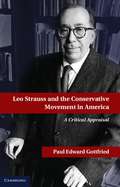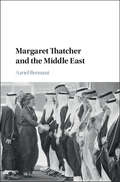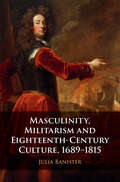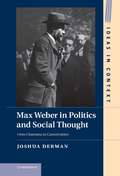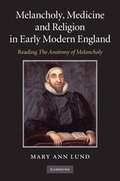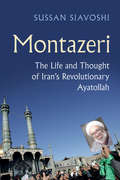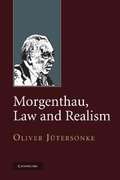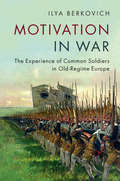- Table View
- List View
Law and Christianity: Pope Benedict XVI’s Legal Thought
by Cartabia, Marta and Simoncini, Andrea Marta Cartabia Andrea SimonciniThroughout Pope Emeritus Benedict XVI's pontificate he spoke to a range of political, civil, academic, and other cultural authorities. These speeches reveal a striking sensitivity to the fundamental problems of law, justice, and democracy. He often presented a call for Christians to address issues of public ethics such as life, death, and family from what they have in common with other fellow citizens: reason. This book discusses the speeches in which the Pope Emeritus reflected most explicitly on this issue, along with commentary from distinguished legal scholars. It responds to Benedict's invitation to engage in public discussion on the limits of positivist reason in the domain of law from his address to the Bundestag. Although the topics of each address vary, they are joined by a series of core ideas whereby Benedict sketches, unpacks, and develops an organic and coherent way to formulate a 'public teaching' on justice and law.
Law and Society in the Age of Theoderic the Great
by Sean D. W. LaffertyThis book explores the evolution of Roman law and society in Italy from 493, with the proclamation of the Ostrogoth Theoderic the Great as king, until about 554, when the eastern Emperor Justinian was able to re-establish imperial authority in the region. Drawing upon evidence from a variety of legal and historical sources, it investigates how Theoderic and his successors attempted to govern the peninsula in the wake of foreign invasions, the collapse of civic administration, the break-up of the Mediterranean economy, and the emergence of new forms of religious and secular authority. It challenges long-held assumptions as to just how peaceful, prosperous and Roman-like Theoderic's Italy really was. Its primary focus is the Edictum Theoderici, a significant but largely overlooked document that offers valuable historical insights into the complex and sometimes contested social, political and religious changes that marked Italy's passage from Antiquity into the Middle Ages.
Leibniz
by Maria Rosa AntognazzaOf all the thinkers of the century of genius that inaugurated modern philosophy, none lived an intellectual life more rich and varied than Gottfried Wilhelm Leibniz (1646-1716). Trained as a jurist and employed as a counsellor, librarian, and historian, he made famous contributions to logic, mathematics, physics, and metaphysics, yet viewed his own aspirations as ultimately ethical and theological, and married these theoretical concerns with politics, diplomacy, and an equally broad range of practical reforms: juridical, economic, administrative, technological, medical, and ecclesiastical. Maria Rosa Antognazza's pioneering biography not only surveys the full breadth and depth of these theoretical interests and practical activities, it also weaves them together for the first time into a unified portrait of this unique thinker and the world from which he came. At the centre of the huge range of Leibniz's apparently miscellaneous endeavours, Antognazza reveals a single master project lending unity to his extraordinarily multifaceted life's work. Throughout the vicissitudes of his long life, Leibniz tenaciously pursued the dream of a systematic reform and advancement of all the sciences, to be undertaken as a collaborative enterprise supported by an enlightened ruler; these theoretical pursuits were in turn ultimately grounded in a practical goal: the improvement of the human condition and thereby the celebration of the glory of God in His creation. As well as tracing the threads of continuity that bound these theoretical and practical activities to this all-embracing plan, this illuminating study also traces these threads back into the intellectual traditions of the Holy Roman Empire in which Leibniz lived and throughout the broader intellectual networks that linked him to patrons in countries as distant as Russia and to correspondents as far afield as China.
Leo Strauss and the Conservative Movement in America
by Paul E. GottfriedThis book offers an original interpretation of the achievement of Leo Strauss, stressing how his ideas and followers reshaped the American conservative movement. The conservative movement that reached out to Strauss and his legacy was extremely fluid and lacked a self-confident leadership. Conservative activists and journalists felt a desperate need for academic acceptability, which they thought Strauss and his disciples would furnish. They also became deeply concerned with the problem of 'value relativism', which self-described conservatives thought Strauss had effectively addressed. But until recently, neither Strauss nor his disciples have considered themselves to be 'conservatives'. Contrary to another misconception, Straussians have never wished to convert Americans to ancient political ideals and practices, except in a very selective rhetorical fashion. Strauss and his disciples have been avid champions of American modernity, and 'timeless' values as interpreted by Strauss and his followers often look starkly contemporary.
Lincoln and the Democrats
by Neely Mark E. Jr.Lincoln and the Democrats describes the vexatious behavior of a two-party system in war and points to the sound parts of the American system which proved to be the country's salvation: local civic pride, and quiet nonpartisanship in mobilization and funding for the war, for example. While revealing that the role of a noxious 'white supremacy' in American politics of the period has been exaggerated - as has the power of the Copperheads - Neely revives the claim that the Civil War put the country on the road to 'human rights', and also uncovers a previously unnoticed tendency toward deceptive and impractical grandstanding on the Constitution during war in the United States.
Lincoln in the Atlantic World
by Louise L. StevensonThis original and wide-ranging work reveals how Abraham Lincoln responded to prompts from around the globe to shape his personal appearance, political appeal, and presidential policies. Throughout his life, he learned lessons about slavery, American politics, and international relations from sources centered in Africa, Britain, and the European continent. Answering questions that previous scholars have not thought to ask, the book opens the vision of Lincoln as a global republican. Thanks to its new stories and compelling analyses, this book provides a provocative and stimulating read that will generate debate at both high and popular levels.
Lincoln's Ethics
by Thomas L. CarsonUnlike many important leaders and historical figures, Abraham Lincoln is generally regarded as a singularly good and morally virtuous human being. Lincoln's Ethics assesses Lincoln's moral character and his many morally fraught decisions regarding slavery and the rights of African-Americans, as well as his actions and policies as commander in chief during the Civil War. Some of these decisions and policies have been the subject of considerable criticism. Lincoln undoubtedly possessed many important moral virtues, such as kindness and magnanimity, to a very high degree. Despite this, there are also grounds to question the goodness of his character. Many fault him as a husband, father and son, and many claim that he was a racist. Carson explains Lincoln's virtues and assesses these criticisms.
Lionel Robbins
by Susan HowsonBy the time of his death the English economist Lionel Robbins (1898-1984) was celebrated as a 'renaissance man'. He made major contributions to his own academic discipline and applied his skills as an economist not only to practical problems of economic policy - with conspicuous success when he served as head of the economists advising the wartime coalition government of Winston Churchill in 1940-45 - and of higher education - the 'Robbins Report' of 1963 - but also to the administration of the visual and performing arts that he loved deeply. He was devoted to the London School of Economics, from his time as an undergraduate following active service as an artillery officer on the Western Front in 1917-18, through his years as Professor of Economics (1929-62), and his stint as chairman of the governors during the 'troubles' of the late 1960s. This comprehensive biography, based on his personal and professional correspondence and other papers, covers all these many and varied activities.
Luther’s Legacy: The Thirty Years War and the Modern Notion of ‘State’ in the Empire, 1530s to 1790s
by Robert Von FriedeburgIn this new account of the emergence of a distinctive territorial state in early modern Germany, Robert von Friedeburg examines how the modern notion of state does not rest on the experience of a bureaucratic state-apparatus. It emerged to stabilize monarchy from dynastic insecurity and constrain it to protect the rule of law, subjects, and their lives and property. Against this background, Lutheran and neo-Aristotelian notions on the spiritual and material welfare of subjects dominating German debate interacted with Western European arguments against 'despotism' to protect the lives and property of subjects. The combined result of this interaction under the impact of the Thirty Years War was Seckendorff's Der Deutsche Fürstenstaat (1656), constraining the evil machinations of princes and organizing the detailed administration of life in the tradition of German Policey, and which founded a specifically German notion of the modern state as comprehensive provision of services to its subjects.
Making Thatcher's Britain
by Ben Jackson Robert SaundersMargaret Thatcher was one of the most controversial figures of modern times. Her governments inspired hatred and veneration in equal measure and her legacy remains fiercely contested. Yet assessments of the Thatcher era are often divorced from any larger historical perspective. This book draws together leading historians to locate Thatcher and Thatcherism within the political, social, cultural and economic history of modern Britain. It explores the social and economic crises of the 1970s; Britain's relationships with Europe, the Commonwealth and the United States; and the different experiences of Thatcherism in Scotland, Wales and Northern Ireland. The book assesses the impact of the Thatcher era on class and gender and situates Thatcherism within the Cold War, the end of Empire and the rise of an Anglo-American 'New Right'. Drawing on the latest available sources, it opens a wide-ranging debate about the Thatcher era and its place in modern British history.
Mao's Little Red Book
by Alexander C. CookMao Zedong's Little Red Book (Quotations from Chairman Mao) - a compilation of the Chinese leader's speeches and writings - is one of the most visible and ubiquitous symbols of twentieth-century radicalism. Published for the first time in 1964, it rapidly became the must-have accessory for Red Guards and revolutionaries from Berkeley to Bamako. Yet, despite its worldwide circulation and enduring presence there has, until now, been no serious scholarly effort to understand this seminal text as a global historical phenomenon. Mao's Little Red Book brings together a range of innovative scholars from around the world to explore the fascinating variety of uses and forms that Mao's Quotations has taken, from rhetoric, art and song, to talisman, badge, and weapon. The authors of this pioneering volume use Mao's Quotations as a medium through which to re-examine the history of the twentieth-century world, challenging established ideas about the book to reveal its remarkable global impact.
Margaret Thatcher and the Middle East
by Azriel BermantMargaret Thatcher and the Middle East examines Thatcher's policy on the Middle East, with a spotlight on her approach towards the Israeli-Palestinian conflict. It questions claims that she sought to counter the Foreign Office Middle East policy, and maintains that the prime minister was actually in close agreement with the Whitehall bureaucracy on the Arab-Israeli conflict. In particular, the volume argues that Thatcher's concerns over Soviet ambitions in the Middle East encouraged her to oppose the policies of Israel's Likud governments, and to work actively for an urgent resolution of the conflict. Furthermore, while Thatcher was strongly pro-American, this was not translated into automatic support for Israel. Indeed, the Thatcher government was very much at odds with the Reagan administration over the Middle East, as a result of Washington's neglect of the forces of moderation in the region.
Martin Luther King Jr. and the Morality of Legal Practice
by Robert K. VischerThis book seeks to reframe our understanding of the lawyer's work by exploring how Martin Luther King Jr. built his advocacy on a coherent set of moral claims regarding the demands of love and justice in light of human nature. King never shirked from staking out challenging claims of moral truth, even while remaining open to working with those who rejected those truths. His example should inspire the legal profession as a reminder that truth-telling, even in a society that often appears morally balkanized, has the capacity to move hearts and minds. At the same time, his example should give the profession pause, for King's success would have been impossible absent his substantive views about human nature and the ends of justice. This book is an effort to reframe our conception of morality's relevance to professionalism through the lens provided by the public and prophetic advocacy of Dr. King.
Masculinity, Militarism and Eighteenth-Century Culture, 1689–1815
by Banister JuliaThis book investigates the figure of the military man in the long eighteenth century in order to explore how ideas about militarism served as vehicles for conceptualizations of masculinity. <P><P>Bringing together representations of military men and accounts of court martial proceedings, this book examines eighteenth-century arguments about masculinity and those that appealed to the 'naturally' sexed body and construed masculinity as social construction and performance. Julia Banister's discussion draws on a range of printed materials, including canonical literary and philosophical texts by David Hume, Adam Smith, Horace Walpole and Jane Austen, and texts relating to the naval trials of, amongst others, Admiral John Byng. <P>By mapping eighteenth-century ideas about militarism, including professionalism and heroism, alongside broader cultural concerns with politeness, sensibility, the Gothic past and celebrity, Julia Banister reveals how ideas about masculinity and militarism were shaped by and within eighteenth-century culture.<P> Provides a multifaceted discussion of the ideas surrounding the figure of the military man in the long eighteenth century.<P> Investigates ideas of masculinity through case studies of five court-martials of such men as Admiral John Byng.<P> Draws on the work of a range of writers from Hume to Austen as well as other less often studied printed sources.
Masters, Slaves, and Exchange
by Kathleen M. HilliardThis book examines the political economy of the master-slave relationship viewed through the lens of consumption and market exchange. What did it mean when human chattel bought commodities, 'stole' property, or gave and received gifts? Forgotten exchanges, this study argues, measured the deepest questions of worth and value, shaping an enduring struggle for power between slaves and masters. The slaves' internal economy focused intense paternalist negotiation on a ground where categories of exchange - provision, gift, contraband, and commodity - were in constant flux. At once binding and alienating, these ties endured constant moral stresses and material manipulation by masters and slaves alike, galvanizing conflict and engendering complex new social relations on and off the plantation.
Max Horkheimer and the Foundations of the Frankfurt School
by John AbromeitThis book is the first comprehensive intellectual biography of Max Horkheimer during the early and middle phases of his life (1895-1941). Drawing on unexamined new sources, John Abromeit describes the critical details of Horkheimer's intellectual development. This study recovers and reconstructs the model of early Critical Theory that guided the work of the Institute for Social Research in the 1930s. Horkheimer is remembered primarily as the co-author of Dialectic of Enlightenment, which he wrote with Theodor W. Adorno in the early 1940s. But few people realize that Horkheimer and Adorno did not begin working together seriously until the late 1930s or that the model of Critical Theory developed by Horkheimer and Erich Fromm in the late 1920s and early 1930s differs in crucial ways from Dialectic of Enlightenment. Abromeit highlights the ways in which Horkheimer's early Critical Theory remains relevant to contemporary theoretical discussions in a wide variety of fields.
Max Weber in Politics and Social Thought: From Charisma to Canonization
by Joshua DermanMax Weber is widely regarded as one of the foundational thinkers of the twentieth century. But how did this reclusive German scholar manage to leave such an indelible mark on modern political and social thought? Max Weber in Politics and Social Thought is the first comprehensive account of Weber's wide-ranging impact on both German and American intellectuals. Drawing on a wide range of sources, Joshua Derman illuminates what Weber meant to contemporaries in the Weimar Republic and Nazi Germany and analyzes why they reached for his concepts to articulate such widely divergent understandings of modern life. The book also accounts for the transformations that Weber's concepts underwent at the hands of émigré and American scholars, and in doing so, elucidates one of the major intellectual movements of the mid-twentieth century: the transatlantic migration of German thought.
Medieval Music, Legend, and the Cult of St. Martin
by Yossi MaureySt Martin of Tours was a protector saint of numerous French kings. His was one of the most successful saintly cults in medieval Europe, and the city of Tours functioned as a religious metropolis, drawing pilgrims from all over the continent. Until now, little has been known about how St Martin came to inspire such a lively folkloric tradition, numerous works of art, and the establishment of thousands of churches and numerous confraternities. In this book, Yossi Maurey addresses these questions by focusing on the church dedicated to the saint in Tours, which acted as the crucible for Martin's cult. Maurey explores the music and liturgy of the cult - the most effective means of its dissemination - to reveal its enormous diffusion and impact. Building a more concrete picture of how saints' cults operated and shaped medieval realities, this book also provides new insights into the interactions between contemporary religion, art and politics.
Melancholy, Medicine and Religion in Early Modern England
by Mary Ann LundThe Anatomy of Melancholy, first published in 1621, is one of the greatest works of early modern English prose writing, yet it has received little substantial literary criticism in recent years. This study situates Robert Burton's complex work within three related contexts: religious, medical and literary/rhetorical. Analysing Burton's claim that his text should have curative effects on his melancholic readership, it examines the authorial construction of the reading process in the context of other early modern writing, both canonical and non-canonical, providing a new approach towards the emerging field of the history of reading. Lund responds to Burton's assertion that melancholy is an affliction of body and soul which requires both a spiritual and a corporal cure, exploring the theological complexion of Burton's writing in relation to English religious discourse of the early seventeenth century, and the status of his work as a medical text.
Military Saints in Byzantium and Rus, 900-1200
by Monica WhiteThe rulers of the Byzantine Empire and its commonwealth were protected both by their own soldiers and by a heavenly army: the military saints. The transformation of Saints George, Demetrios, Theodore and others into the patrons of imperial armies was one of the defining developments of religious life under the Macedonian emperors. This book provides a comprehensive study of military sainthood and its roots in late antiquity. The emergence of the cults is situated within a broader social context, in which mortal soldiers were equated with martyrs and martyrs of the early Church recruited to protect them on the battlefield. Dr White then traces the fate of these saints in early Rus, drawing on unpublished manuscripts and other under-utilised sources to discuss their veneration within the princely clan and their influence on the first native saints of Rus, Boris and Gleb, who eventually joined the ranks of their ancient counterparts.
Modernist Voyages
by Anna SnaithLondon's literary and cultural scene fostered newly configured forms of feminist anticolonialism during the modernist period. Through their writing in and about the imperial metropolis, colonial women authors not only remapped the city, they also renegotiated the position of women within the empire. This book examines the significance of gender to the interwoven nature of empire and modernism. As transgressive figures of modernity, writers such as Jean Rhys, Katherine Mansfield, Una Marson and Sarojini Naidu brought their own versions of modernity to the capital, revealing the complex ways in which colonial identities 'traveled' to London at the turn of the twentieth century. Anna Snaith's timely and original study provides a new vantage point on the urban metropolis and its artistic communities for scholars and students of literary modernism, gender and postcolonial studies, and English literature more broadly.
Montazeri: The Life and Thought of Iran's Revolutionary Ayatollah
by Sussan SiavoshiBy the time of his death in 2009, the Grand Ayatollah Montazeri was lauded as the spiritual leader of the Green movement in Iran. Since the 1960s, when he supported Ayatollah Khomeini's opposition to the Shah, Montazeri's life reflected the crucial political shifts within Iran. In this book, Sussan Siavoshi presents the historical context as well as Montazeri's own political and intellectual journey. Siavoshi highlights how Montazeri, originally a student of Khomeini became one of the key figures during the revolution of 1978-9. She furthermore analyses his subsequent writings, explaining how he went from trusted advisor to and nominated successor of Khomeini to an outspoken critic of the Islamic Republic. Examining Montazeri's political thought and practice as well as the historical context, Siavoshi's book is vital for those interested in post-revolutionary Iran and the phenomenon of political Islam.
Morgenthau, Law and Realism
by Oliver JütersonkeAlthough widely regarded as the 'founding father' of realism in International Relations, this book argues that Hans J. Morgenthau's legal background has largely been neglected in discussions of his place in the 'canon' of IR theory. Morgenthau was a legal scholar of German-Jewish origins who arrived in the United States in 1938. He went on to become a distinguished professor of Political Science and a prominent public intellectual. Rather than locate Morgenthau's intellectual heritage in the German tradition of Realpolitik, this book demonstrates how many of his central ideas and concepts stem from European and American legal debates of the 1920s and 30s. This is an ambitious attempt to recast the debate on Morgenthau and will appeal to IR scholars interested in the history of realism as well as international lawyers engaged in debates regarding the relationship between law and politics, and the history of international law.
Motivation in War: The Experience of Common Soldiers in Old-Regime Europe
by Ilya BerkovichThis book fundamentally revises our notion of why soldiers of the eighteenth century enlisted, served and fought. In contrast to traditional views of the brutal conditions supposedly prevailing in old-regime armies, Ilya Berkovich reveals that soldiers did not regard military discipline as illegitimate or unnecessarily cruel, nor did they perceive themselves as submissive military automatons. Instead he shows how these men embraced a unique corporate identity based on military professionalism, forceful masculinity and hostility toward civilians. These values fostered the notion of individual and collective soldierly honour which helped to create the bonding effect which contributed toward greater combat cohesion. Utilising research on military psychology and combat theory, and employing the letters, diaries and memoirs of around 250 private soldiers and non-commissioned officers from over a dozen different European armies, Motivation in War transforms our understanding of life of the common soldier in early modern Europe.
Multidimensional Democracy
by Jeffrey J. HardenMultidimensional Democracy examines political representation from the supply (legislator) and demand (constituent) perspectives. Focusing on four dimensions - policy, service, allocation, and descriptive representation - it documents systematic variation in what people want from legislators and what legislators choose to emphasize while in office. It has important implications for the study of representation, as well as normative questions about political inequality in America. The demand-side results show that constituents who are economically advantaged tend to prefer policy-based representation while the disadvantaged place relatively more importance in constituent service and/or allocation. Suggestive results from the legislator data complement this finding; legislators in wealthy, white districts tend to focus more on policy while those representing economically disadvantaged and racially diverse districts may place more emphasis on service and/or allocation. A likely consequence is that the policy choices made by representatives reflect the policy preferences of the economically advantaged because policy representation is what those citizens want.

